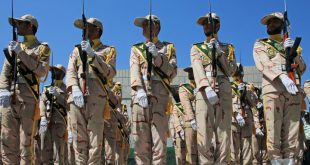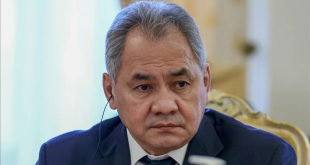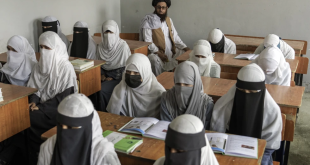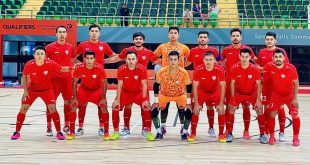The top US commander said that he was increasingly seeing a “convergence between the Haqqanis, the Taliban, the Al Qaeda and the Lashkar-e-Taiba” in Afghanistan. THE HAQQANI network, a UN-designated terrorist group which has killed Indian diplomats, military officials and civilians in Afghanistan in recent years, continues to enjoy sanctuary in Pakistan and operates freely from there, the top US commander in Afghanistan John Nicholson has said. In an interview with The Indian Express in Kabul, Nicholson said, “We see, on the one hand, a stated aspiration for reconciliation (on the part of the Pakistan government, by bringing the Taliban to the table for peace talks). While on the other, the Haqqanis still enjoy sanctuary and can operate freely from inside Pakistan and this continues to be a concern.”
Nicholson’s comments are significant, especially in the wake of the Guardian newspaper recently claiming that senior Taliban officials, including Abdul Manan Akhund, a brother of former Taliban chief Mullah Omar, twice met the Afghan intelligence chief Mohammed Masoom Stanekzai in Doha in September.
Notably, a US official was reportedly present in the secret talks, but more importantly, there were no Pakistanis at all. A Taliban source in Kabul, who spoke on the condition of anonymity, said this development “perhaps signaled an unusual, if growing disillusionment between the Taliban and their sponsors in Pakistan.”
Nicholson, who commands a US-led coalition of about 13,000 troops from several countries in Afghanistan, said he would give the Pakistani government and the army “great credit” for mounting an operation against terrorists and other insurgents, called ‘Zarb-e-Azb’, in the borderlands between Afghanistan and Pakistan.
One consequence of this operation was that several terrorists, including the Pakistani Taliban, were forced to migrate to Afghanistan, thereby allowing the Afghan security forces to target them. “But we haven’t seen that with the Haqqanis. They were not forced over (into Afghanistan by the Pakistani operation).The Haqqanis continue to conduct operations from inside Pakistan, against Afghans and the US-led coalition,” Nicholson said.
The top US commander said that he was increasingly seeing a “convergence between the Haqqanis, the Taliban, the Al Qaeda and the Lashkar-e-Taiba” in Afghanistan. Meaning, terror groups targetting both Indians and Americans were increasingly using Afghanistan as a base to carry out their attacks.
That is why in 2015 the US Congress passed a law which mandated the US Department of Defence to certify that the
Pakistanis “were doing enough against the Haqqanis” in order to release aid.
“I recommended to Secretary Carter (US Secretary of Defence Ashton Carter) that there was not enough pressure being put on the Haqqanis, by Pakistan, on their sanctuaries in Pakistan.We are very concerned about the Haqqanis,” Nicholson said.
Led by Sirajuddin Haqqani, who is also a deputy to the new Taliban chief Haibatullah Akhundzada, the Haqqani network is said to have close links with Pakistan’s intelligence agency, the ISI.
It was said to have masterminded the attack against the Indian embassy in Kabul in 2008 in which the Indian defence attaché, a diplomat and 56 other people lost their lives, a suicide bombing at the Park Residence hotel in 2009 in which nine Indians were killed, besides an assassination attempt against former Afghan president Hamid Karzai in 2008.
So, as the international community celebrates 15 years of the liberation of Afghanistan from the Taliban, the situation in this country located at the crossroads of Asia is both grim and hopeful, fragile and upbeat.
The capital, Kabul, as well as major cities like Herat close to the border with Iran, are packed with traffic during the day. Other towns like Kunduz in the north have fallen to the Taliban, for the second time in two years, while Lashkar Gah, the capital of opium-rich Helmand province in the south, is said to be teetering towards an insurgent takeover.
Nicholson believes the Afghan government controls about 68 per cent of the population and 62 per cent of the country’s 398 districts (in 34 provinces), while “the enemy” controls 10 per cent of the population as well as districts. “The balance is in play,” he said, pointing out that despite a concerted effort by the Taliban to capture a major city, it has not succeeded.
“As many as 20 of 98 UN and US-designated terrorist organisations stay in the Afghanistan-Pakistan region,” said Nicholson, pointing to the fragile nature of the peace that exists. These include the Haqqanis Network and the LeT, which also target Indians, the Taliban, the Al Qaeda and Al Qaeda in the Sub-continent (AQIS) which target the US, the ETIM which include Uighurs from China, as well as the Tariq Gidar Group (TGG) which massacred 148 children in a Peshawar school in 2014.
He pointed out that the killing, by US forces in May, of Taliban chief Mullah Akhtar Mansour in a drone strike inside Pakistan, was a signal that the US would continue to target elements hostile to the Afghan peace and reconciliation process.
“The US carried out the strike in which Mullah Mansour was killed. In fact, in the last seven months we have killed
the emirs of various terror organisations, including the TTG,” Nicholson said. Mansour was targetted because the US
expected him to join the quadrilateral peace talks in Doha — the Pakistanis had promised as much.
“The Pakistanis told us they would deliver Mansour to the peace process,” he said. But when the Taliban rejected the peace talks and issued a declaration of war against Afghanistan, President Obama gave us the orders to strike,” Nicholson said.
As for Kunduz in the north, from where thousands of civilians are leaving because of door-to-door gunfighting over the last couple of weeks, Nicholson insisted that unlike last year, the Taliban only control parts of the city.
Meanwhile, no one has claimed responsibility for the blasts against the beautiful Shia Karte-e-Sakhi shrine in Kabul — as well as in the northern Balkh province on Ashura on October 11 — although this reporter saw how the city simply shut down as soon as news of the blast came in, mostly by word of mouth.
Unconfirmed reports also say that Vice-President Rashid Dostum, a major Uzbek leader, was targetted in a bomb
attack in the northern city of Mazar-i-Sharif last week, but that he escaped.
Certainly, parts of the US establishment like the Pentagon, want India to play a larger role in stabilising Afghanistan — even if other parts, like Obama’s special representative to Afghanistan-Pakistan Richard Olson, continues to hold out for a special place for Pakistan.
Interestingly, Nicholson was profuse in his appreciation not only of Indian initiatives like the Salma dam in western Afghanistan which promises to irrigate 70,000 hectares, but of the gift of four attack helicopters and the offer to train Afghan security forces in India.
As the US presidential election becomes increasingly polarised, the realisation that America’s “longest war” has already cost it more than a trillion dollars and hundreds of lives is pushing the Americans to push regional powers like India, Iran and China to play a larger role in stabilising the region. Clearly, General John Nicholson is adding his voice to that effort. (Indian Express)
 Afghanistan Times
Afghanistan Times




